Before performing last Friday at Asia’s bellwether music festival, Fuji Rock in Japan, the Taiwanese indie band Sunset Rollercoaster (落日飛車) had previously performed on one of the festival’s smaller stages and also at Coachella, the biggest brand name in US music festivals. But this set on Fuji Rock’s main stage was a true raising of the bar.
On a brilliant summer’s evening, with the sun rays streaming down over a backdrop of green mountains and fluffy white clouds, the performance saw the Taiwanese groovemasters team up with South Korean group Hyukoh, with whom they’ve formed a temporary supergroup called AAA — an abbreviation for “Access All Areas.” The combo features all 10 members of both bands and sings mostly in English plus a smattering of Korean.
Though no official attendance is given for any single Fuji Rock performance, the capacity of the festival’s main stage, the Green Stage, is estimated to be about 40,000, and according to organizers, 33,000 attended the festival that day, though this crowd was divided between four main stages and other smaller venues.
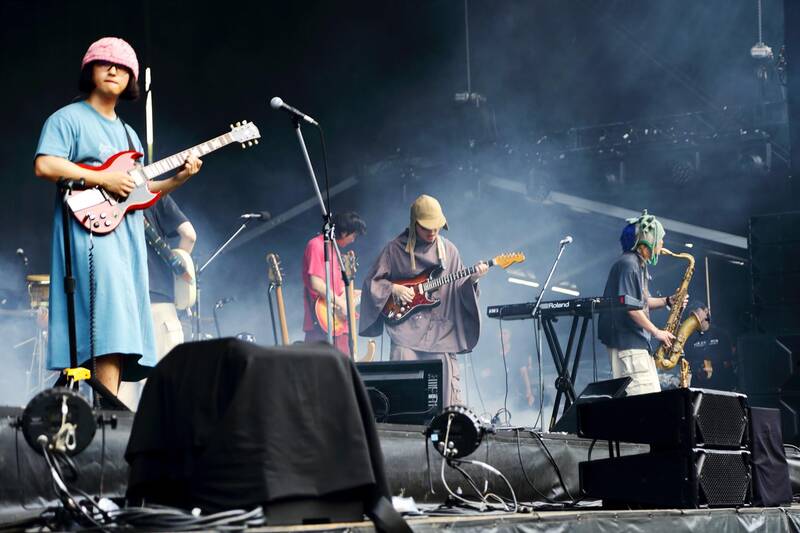
Photo: David Frazier
“It’s beyond words, actually, to me,” said Tseng Kuo-hung (曾國宏), Sunset Rollercoaster’s vocalist and main songwriter, interviewed by the Taipei Times on Sunday by video call from his Tokyo hotel room.
“I can only say it was really amazing. For us, it was such an honor.”
Front row fans were a mix of Japanese, Koreans, Taiwanese and Westerners, and behind them the massive fields were largely filled. The crowd rocked ecstatically to one real humdinger of a set, which was only slightly marred by technical issues — an almost unheard of problem at Fuji Rock — that shut down the main stage video screens, forcing the bands to do without elaborate visuals set to accompany the music.
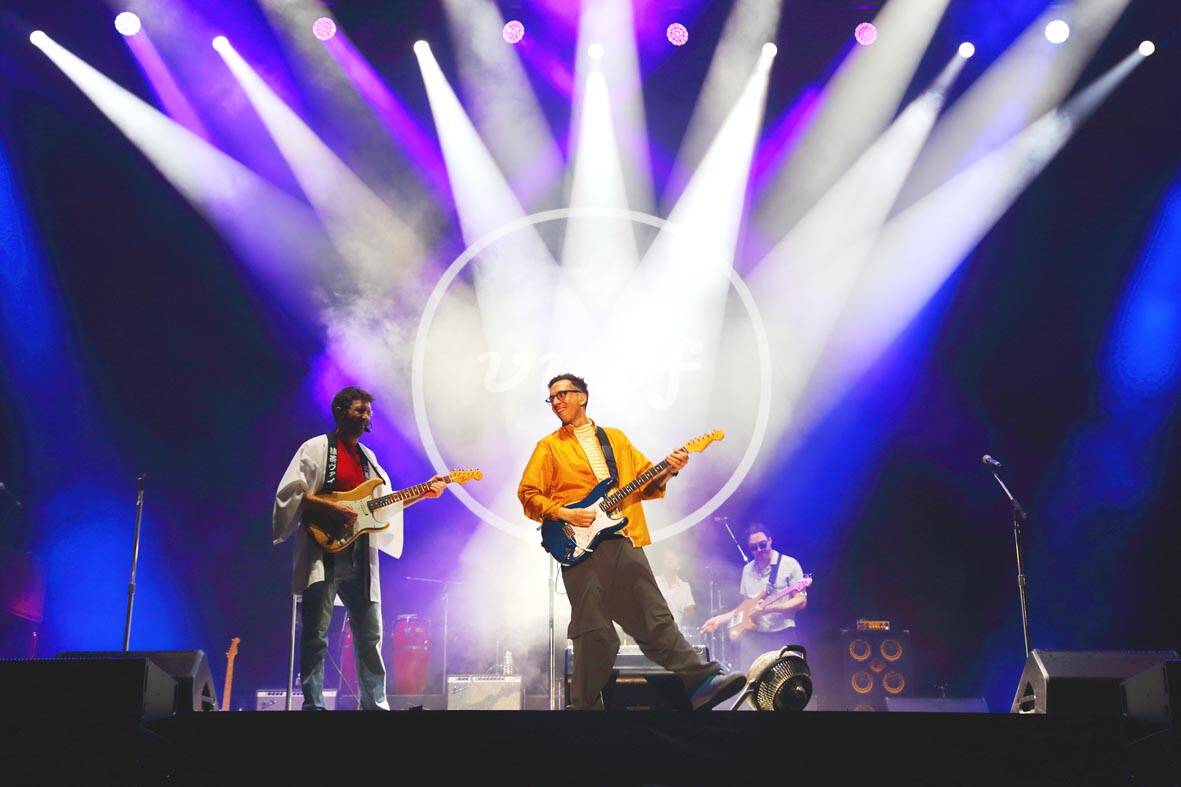
Photo: David Frazier
“After the show I saw some feedback on the Internet,” Tseng said. “People were saying, this time they’re trying to be really minimal and concentrate on the music. But it wasn’t intentional. The power generator shut down.”
ASIA FOCUSED
The gig was a landmark not only for Sunset Rollercoaster and Hyukoh, but also, in a way, for Fuji Rock itself.
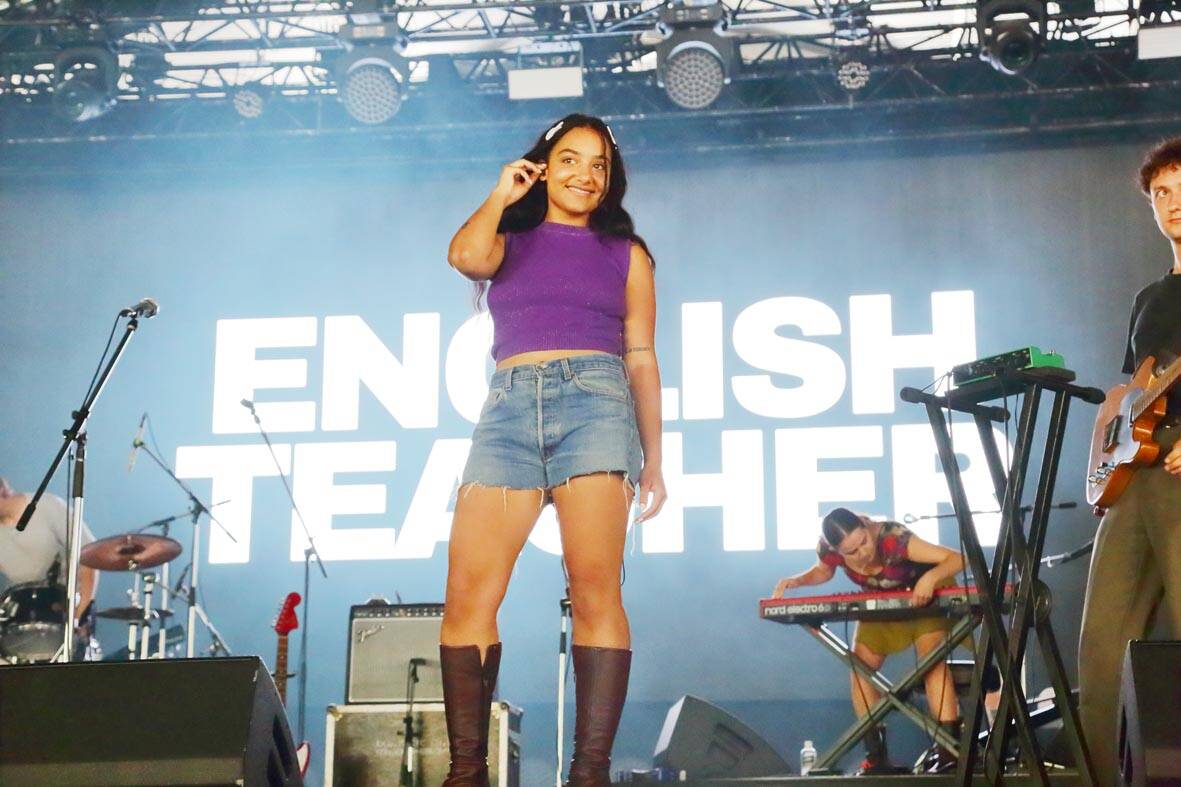
Photo: David Frazier
Fuji Rock is placing a growing emphasis on Asia-region stars as it reacts to a post-COVID environment that’s proven difficult for major music festivals worldwide. A drastic weakening of the Japanese yen has also made Western headliners far more expensive.
While the festival continued to showcase big Western acts, including Vampire Weekend, The Hives and Little Simz, this year’s lineup experimented by inviting two festival headliners that had never before performed in Japan, UK electronic music producer Fred again.. and American funk band Vulfpeck.
Asian artists, in addition to the AAA combo, included Indonesian surf-rock band The Panturas and South Korean retro-groove outfit Lee Nalchi and a few others. A new Orange Echo stage was introduced as “Japan and Asia-themed.”
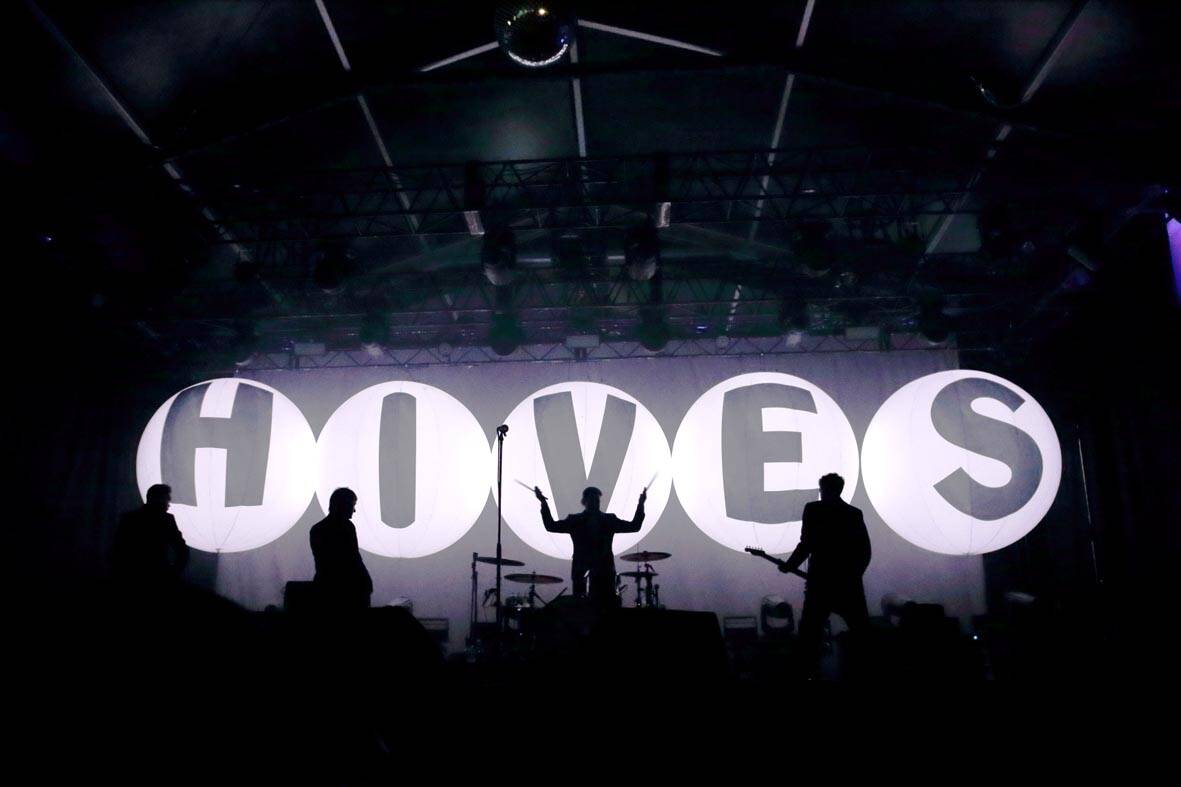
Photo: David Frazier
“We are actively trying to attract music fans from other Asian countries,” Noriyuki Yamamoto, the head of artist bookings at Fuji Rock, recently told the Japan Times. “The purpose is to present a lineup that shows a wide variety, which is the point of a festival.”
The rise of Asia-region indies has also been very Internet-driven, as streaming platforms have broken down barriers separating national markets.
Sunset Rollercoaster and Hyukoh have both built up impressive listener statistics and wide-ranging fan bases. Hyukoh boasts around 325 million streams on YouTube and 680,000 monthly listeners on Spotify, even though it has not released an album in six years. Sunset Rollercoaster has 850,000 monthly Spotify listeners and 30 million YouTube streams.
Though it is hard to say which band is more popular, anecdotal evidence suggests Hyukoh is bigger in Japan, while Sunset Rollercoaster has more fans in China and southeast Asia.
And now, with the recent collaboration, “we somehow exchanged our fan bases,” Tseng said.
“I was already a fan of Hyuko, then when they teamed up with Sunset Rollercoaster, it was like they went to the next level,” said Kyoko Fukuda, a 31-year-old woman from Nagano, Japan, who watched the Fuji Rock performance from mid-field.
“Hyuko is really powerful, and Sunset Rollercoaster is really chill — their songs are really beautiful,” she said, adding, “But I’ve never seen two bands team up like this. It’s really rare, isn’t it?”
COLLABORATION AMONG MUSIC NERDS
It most certainly is rare, especially considering that one group is Korean and the other Taiwanese. The unique musical collaboration, however, is the culmination of almost a decade of friendship among self-avowed music nerds.
The two bands first met in 2016 when Hyukoh toured to Taipei and dropped in on a Sunset Rollercoaster gig. The two band leaders — Sunset Rollercoaster’s Tseng and Hyukoh’s musical mastermind Oh Hyuk — hit it off, and after both bands played Fuji Rock in 2019, collaborations began to happen.
In 2020, Oh contributed music to the Sunset Rollercoaster’s song Candlight, on their album Soft Storm, and in return, Tseng worked on the Hyukoh song Help on the EP Through Love. That same year, Oh invited Tseng to co-write a song he was producing for K-pop star RM from the boy band BTS, Come Back To Me, the lead single on his 2024 album Right Place, Wrong Person.
Coming out of COVID, the two groups wanted to try an experiment of getting together to co-write and co-produce an EP of four songs.
After a week in a music studio in a quiet village outside of Seoul called Gapyeong, “We had all the melodies and all the arrangements,” Tseng said. “And that’s when we started to become greedy and think, actually, this has really good potential to become an album.”
The result was AAA, an album of eight songs which may go down as a masterpiece for both bands. At Fuji Rock, its anthemic lead single, Young Man, played early in the set, was what really got the crowd rocking.
The AAA tour also grew, or rather snowballed, organically. Album launches in Seoul and Taipei in September last year filled two shows in each city. A month later, the supergroup sold out two nights in a 3,000-capacity venue in Tokyo. During the past year, the groups have played 19 shows in 13 cities in 10 countries. Soon after the Tokyo gigs, the AAA combo received an invitation to play Fuji Rock.
CITY POP
For Sunset Rollercoaster, this level of success was virtually unknown for Taiwanese indie bands when they started out in 2010. The band started off gigging in small Taipei rock clubs like Underworld (地下社會) and Revolver.
Six years later, however, the group catapulted to Internet fame with the release of their EP Jinji Kikko, which found its way into playlists for trending genres of city pop and vaporwave and thus tapped into an unanticipated global listenership.
“When I made the EP, I didn’t even know there was a genre called city pop,” said Tseng, who claims he was then emulating early 80s pop like Hall and Oats and Steely Dan, music with “a lot of jazz chords and weird harmonics.”
City pop is in many senses a retroactively invented genre, a label placed on Japanese pop from the early 1980s, which in turn derived much of its sound from American pop music of about the same time.
Though there were a few contemporaneous references to “city pop” by Japanese music critics, it was really during the mid-2010s that the genre was rediscovered and exploded via music streaming platforms — especially YouTube. But the problem for both fans and the music business was that the original city pop artists had long stopped performing and there were no contemporary city pop bands.
“I think we just released the right music at the right time,” Tseng said.
NEW ALBUM?
After Fuji Rock, the AAA collaboration will hold its final performance tomorrow at Korea’s Pentaport Rock Festival. After that, Tseng says the bands will go their separate ways, though they’ll continue to collaborate in other ways.
Hyukoh has made recent social media posts from a UK recording studio, dropping the hint that they may have an album coming soon. Tseng was with them in the studio, but cannot comment on what will come of it.
As for Sunset Rollercoaster, he can confirm that the band is preparing a new album.
“It’s done actually,” said Tseng, adding, “We’ll release it really soon. But that’s the only thing I can tell you.”

Oct. 27 to Nov. 2 Over a breakfast of soymilk and fried dough costing less than NT$400, seven officials and engineers agreed on a NT$400 million plan — unaware that it would mark the beginning of Taiwan’s semiconductor empire. It was a cold February morning in 1974. Gathered at the unassuming shop were Economics minister Sun Yun-hsuan (孫運璿), director-general of Transportation and Communications Kao Yu-shu (高玉樹), Industrial Technology Research Institute (ITRI) president Wang Chao-chen (王兆振), Telecommunications Laboratories director Kang Pao-huang (康寶煌), Executive Yuan secretary-general Fei Hua (費驊), director-general of Telecommunications Fang Hsien-chi (方賢齊) and Radio Corporation of America (RCA) Laboratories director Pan

President William Lai (賴清德) has championed Taiwan as an “AI Island” — an artificial intelligence (AI) hub powering the global tech economy. But without major shifts in talent, funding and strategic direction, this vision risks becoming a static fortress: indispensable, yet immobile and vulnerable. It’s time to reframe Taiwan’s ambition. Time to move from a resource-rich AI island to an AI Armada. Why change metaphors? Because choosing the right metaphor shapes both understanding and strategy. The “AI Island” frames our national ambition as a static fortress that, while valuable, is still vulnerable and reactive. Shifting our metaphor to an “AI Armada”

When Taiwan was battered by storms this summer, the only crumb of comfort I could take was knowing that some advice I’d drafted several weeks earlier had been correct. Regarding the Southern Cross-Island Highway (南橫公路), a spectacular high-elevation route connecting Taiwan’s southwest with the country’s southeast, I’d written: “The precarious existence of this road cannot be overstated; those hoping to drive or ride all the way across should have a backup plan.” As this article was going to press, the middle section of the highway, between Meishankou (梅山口) in Kaohsiung and Siangyang (向陽) in Taitung County, was still closed to outsiders
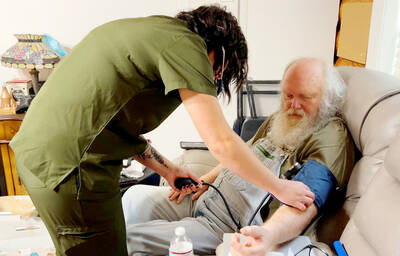
The older you get, and the more obsessed with your health, the more it feels as if life comes down to numbers: how many more years you can expect; your lean body mass; your percentage of visceral fat; how dense your bones are; how many kilos you can squat; how long you can deadhang; how often you still do it; your levels of LDL and HDL cholesterol; your resting heart rate; your overnight blood oxygen level; how quickly you can run; how many steps you do in a day; how many hours you sleep; how fast you are shrinking; how